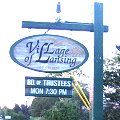- By Dan Veaner
- News
 Print
Print  Village of Lansing Trustees and Planning Board members met Monday to begin to sort out the Village's role in providing affordable and workforce housing. With thousands of workers commuting to Tompkins County every day and more than 4,000 of them coming to work in the Village, Tompkins County and large employers such as Cornell university have been trying to encourage municipalities to do what they can to increase the number of available affordable homes.
Village of Lansing Trustees and Planning Board members met Monday to begin to sort out the Village's role in providing affordable and workforce housing. With thousands of workers commuting to Tompkins County every day and more than 4,000 of them coming to work in the Village, Tompkins County and large employers such as Cornell university have been trying to encourage municipalities to do what they can to increase the number of available affordable homes. "The Planning Board has no position pro or con on this issue," Planning Board Chairman Ned Hickey told the Board of Trustees. "We've come to a point where we don't know an awful lot about it, but we have an interest level."
 (Left to right)Planning Board members Phil Dankert, Carol Klepack, Deputy Mayor Larry Fresinski, Trustee Lynn Leopold, Clerk Jodi Dake, Mayor Donald Hartill, Attorney David Dubow, Planning Board Chairman Ned Hickey, Planning Board member Maria Stycos, Code Enforcement/Zoning Officer Ben Curtis, Trustees Julie Baker, john O'Neill, Planning Board alternate Richard Durst |
Tompkins County grew from 94,097 to 96,501 people between the 1990 and 2000 censuses. Today the county is estimated to have a population of 101,055, 48,500 of whom commute to work. But the county is concerned with tens of thousands more workers who commute here from other counties. "It's in everyone's best interest to keep those employees here," explained Village Attorney David Dubow. "They spend money here. They support the economy here. It's fuel efficient for them to be here."
The Village and Town of Lansing are geographically prime areas for new development. The Town Board has considered zoning changes and other measures to encourage affordable housing. The failure last year to bring sewer to the town hurt that effort, but officials are interested in doing what they can. Space for potential developments is relatively plentiful in the town, but Hickey says there are only about 100 acres available in the whole Village that could potentially be devoted to workforce housing. Hickey noted that Cornell University is setting aside $10 million for workforce housing.
According to CNNMoney.com Ithaca ranks 66th in the nation on a scale of home purhase affordability. They state that the median sales price for houses here is $138,000, which is in line with County definitions of 'affordable housing.'
The boards discussed possible ways the Village could encourage such building within its borders, including inclusionary zoning and incentive zoning. The former would require developers to set aside a percentage of each development for affordable housing. The latter would offer incentives to builders that might include special permits that increase density of developments, or reduction of property taxes.
Village Code Enforcement/Zoning Officer Ben Curtis noted that 50% of Village residents live in apartments, that are suited for workforce, transient, and student residents. He noted that the next highest percentage falls in the City of Ithaca at 38%. "We're way off the chats as far as affordable housing is concerned," he said.
"We're talking less than 100 acres of land that can be developed," he said. "Maybe we don't need to do this, although there seems to be a social need to do it."
Deputy Mayor Larry Fresinski brought up his concern that codifying exceptions to zoning laws would undermine their intention and Village priorities. "Our present regulations are put in place for the purposes of safety and business and residential separation," he said. "The incentives you are talking about are reducing density on a normal property. Does that mean we are willing to give up safety -- the amount of space between houses to get equipment in in case of fire and things like that? If you reduce it there why wouldn't we reduce it elsewhere?"
Officials decided to approach County and Cornell officials to get a clearer idea of what they have in mind for affordable housing in the Village.
----
v4i43



